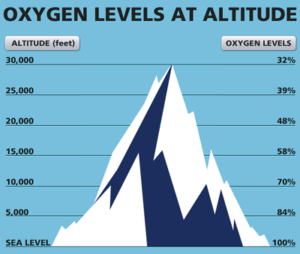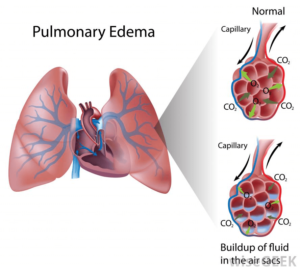On May 10, 1996, Scott Fischer, a world-renowned climber, and professional climbing guide, slowly ascended to the summit of Everest. Little did he notice the fatal changes happening within his body. He grew increasingly ill and mentally impaired, dying on the descent. Fischer succumbed to High Altitude Pulmonary Edema (HAPE), a condition occurring at high altitudes in which the lungs fill with fluid, preventing efficient oxygenation of the blood, ultimately leading to death if left untreated.
HAPE is a silent killer, and nearly impossible to self-diagnose due to the effects that oxygen deprivation has on the brain. It is therefore vital to have partners who constantly monitor the physical and mental conditions of each other. By understanding the causes, symptoms, and treatment for HAPE, you can minimize the risk of a fatal outcome for you and your partner(s).

What causes HAPE?
HAPE occurs at high altitudes, generally above 11,500 feet. High altitude means low pressure and low atmospheric oxygen concentration.

A primary impact of low oxygen levels on the body is increased blood pressure. In the case of HAPE, the blood pressure becomes high enough to rupture capillary tissue in the lung and release blood, plasma, and other fluids into the lungs. This has devastating effects on the human body: decreased lung capacity and low blood oxygen concentration.

What are the symptoms of HAPE?
It is often hard for victims of HAPE to self diagnose, due to the effects that oxygen deprivation have on the brain. This means that the victim’s life rests in their partners’ hands. Keep your eye on your partner(s) for the following symptoms:
- Extreme shortness of breath or difficulty breathing (dyspnea) that worsens with activity or when lying down
- A feeling of suffocating or drowning that worsens when lying down
- Wheezing or gasping for breath
- Cold, clammy skin
- Anxiety, restlessness or a sense of apprehension
- A cough that produces frothy sputum that may be tinged with blood
- Blue-tinged lips
- A rapid, irregular heartbeat (palpitations)
- Foggy, slow, or inconsistent thinking
(Credit: Mayo Clinic)
How can you treat HAPE?
The earlier HAPE is treated, the better. If you observe HAPE symptoms in your partner, and if you have oxygen on hand, supply oxygen immediately. Supplying oxygen increases the concentration of oxygen filling the flooded air sacs. This keeps the body functioning and should prevent the long term impacts of HAPE. Delivering oxygen is only a temporary fix; it does not resolve the issue of increased blood pressure and does not stop the lungs from filling with fluid. To address this underlying problem, external pressure and oxygen concentration must be increased. To increase air pressure, return to the lowest elevation possible as quickly as possible. The lower elevation is helpful because there is both a higher concentration of oxygen and higher pressure. This reduces leakage from the capillaries into the lungs and gives them a chance to repair. Rest and fluids will further allow your body to recover.
How can you prevent HAPE?
The best way to reduce your risk of getting HAPE is to acclimatize slowly. Acclimatization means slowly increasing in altitude. This allows your body to adjust to low oxygen levels and decrease your blood pressure, which prevents capillaries from breaking and therefore decreasing the likelihood HAPE.
Another way to reduce your risk of getting HAPE is to increase your iron intake before and during acclimatization. Iron allows your body to create more red blood cells, which increases your blood oxygen capacity. By having better oxygen capacity, even if you have HAPE, you will have more oxygen traveling to the brain and preventing long term damage. You can either take iron vitamin supplements, or eat foods that are high in iron, such as shellfish, spinach, or red meat (SOURCE: https://www.healthline.com/nutrition/healthy-iron-rich-foods#1.-Shellfish). Consult your physician about iron supplement dosage. Iron can be dangerous in high doses.
You might also consider vasodilating compounds to lower blood pressure and therefore lower your risk of getting HAPE. Consult your physician about vasodilating medications and/or consume foods rich in potent vasodilators such as leafy greens, spicy foods, and garlic.
Talk with your partners so you have a common understanding of the symptoms of treatments of HAPE. Doing so can save you and your high altitude partners from suffering long-term or even deadly consequences.